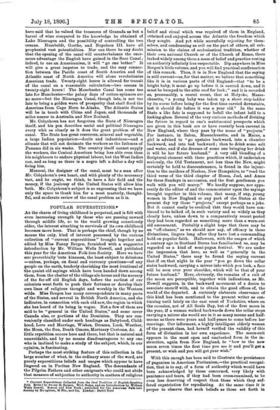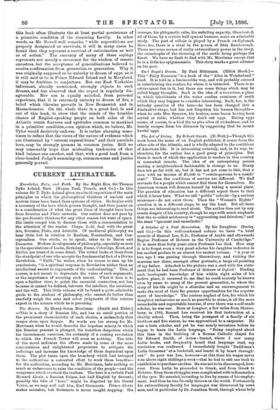POPULAR S UPE RSTITIONS.*
As the charm of living childhood is perpetual, and is felt with even increasing strength by those who are passing onward through middle life, so to the world growing consciously older, the interest attaching to survivals of its own childhood becomes more keen. That is perhaps the chief, though by no means the only, kind of interest possessed by the curious collection of " current superstitions" brought together and edited by Miss Fanny Bergen, furnished with a suggestive introduction by Mr. William Wells Newell, and published this year for the American Folk-lore Society. Here we have our proverbially 'cute kinsmen, the least subject to delusions —unless, perhaps, on fiscal and currency questions—of any people on the earth, tenderly cherishing the most irrational of the quaint old sayings which have been handed down among -them, from the chatter of the village ale-house and the nursery of the far-off old English days, before the earliest of our colonists went forth to push their fortunes or develop their own lines of religious thought and worship in the Western wilds. Miss Bergen has many correspondents in many parts of the States, and several in British North America, and she indicates, in connection with each old saw, the region in which she has heard of its being in vogue. Not a few of them are said to be "general in the United States," and some cover Canada also, or portions of the Dominion. They are con- veniently classified under such headings as Babyhood, Child- hood, Love and Marriage, Wishes, Dreams, Luck, Weather, the Moon, the Sun, Death Omens, Mortuary Customs, &c. A little repetition occurs here and there, but that is natural and unavoidable, and by no means disadvantageous to any one who is inclined to make a study of the subject, which, in our opinion, is fascinating.
Perhaps the most striking feature of this collection is the large number of what, in the ordinary sense of the word, are purely superstitions beliefs and usages which appear to have lingered on in Puritan New England. The descendants of the Pilgrim Fathers and other emigrants who could not abide that measure of subjection to authority in matters of religious
• Current Superstitions Collected from the Oral Tradition of Engliak.Speaking Folk. Vital by Falny D. Bergen. With Notes, and an Introduatioa by William Wells Newell. Boiton and New York : published for the American Felk.lore Booiety by Ho ughton, 31.Min, and Co, London David Nett belief and ritual which was required of them in England, obtained and enjoyed across the Atlantic the freedom which they sought. And yet while scornfully rejecting for them- selves, and condemning as evil on the part of others, all sub- mission to the claims of ecclesiastical tradition, whether of their own national Church or of the Church of Rome, there lurked widely among them a mass of belief and practice resting on authority infinitely less respectable. Dip anywhere in Miss Bergen's little volume, and you will find practical confirmation of this remark. Thus, it is in New England that the saying is still current—as, for that matter, we believe that something like it is in various parts of Old England—that "to be a bright baby, it must go up before it is carried down, and it must be bumped to the attic roof for luck ; " and it is recorded as, presumably, a recent event, that at Holyoke, Massa- chusetts, "a young baby was taken up a short step-ladder by its nurse before being for the first time carried downstairs, lest it should die before it was a year old." In the same State a like fate is supposed to befall the infant held to a looking-glass. Several of the very curious methods of divining the future in regard to one's matrimonial prospects which are given in this book are or have recently been current in New England, where they pass by the name of "projects." For instance, in Salem, Massachusetts, and in Maine, a girl is advised to "go upstairs backward, into a chamber backward, and into bed backward ; then to drink some salt and water, and if she dreams of some one bringing her drink it will be her future husband." A very odd blending of a Scriptural element with these practices which, if undertaken seriously, the Old Testament, not less than the New, might certainly be held to discountenance, is found in the injunc- tion to the maidens of Nashua, New Hampshire, to "read the third verse of the third chapter of Hosea, Joel, and Amos for three Sundays in succession, and the first gentleman you walk with you will marry." We hardly suppose, nor appa- rently do the editor of and the commentator upon the sayings brought together in this volume, that many, if any, young women in New England or any part of the States at the present day try these 'projects," except perhaps as a joke. But it cannot easily be credited that they would have con- tinued to be talked of, in such variety and so widely as they clearly have, unless down to a comparatively recent period they had been regarded as something more than a worn-out old amusement. Probably a slight hope that there may be an "off-chance," as we should now say, of efficacy in these divinations, lingers long after they have lost a commanding hold on popular faith. Halloween, with the usages of which a century ago in Scotland Burns has familiarised us, may be regarded as a kind of semi-pagan festival. We are under the impression that here, as well as " generally in the United States," there may be found the saying current that if on that night in the year "you go down the cellar stairs backward, carrying a mirror into which you look, a face will be seen over your shoulder, which will be that of your future husband." Here, obviously, the remains of a cult of the moon are perceptible, together with indications, as Mr. Newell suggests, in the backward movement of a desire to associate oneself with, and to obtain the good offices of, the world of the departed. A curiously elaborate observance of this kind has been mentioned to the present writer as con- tinuing until lately on the east coast of Yorkshire, where on the occasion, not of All Souls Day, but of the first moon in the year, if a woman walked backwards down the cellar steps carrying a mirror she would see in it as many moons and half- moons as there were years and half-years to come before her marriage. Our informant, a highly intelligent elderly woman of the peasant class, had herself verified the validity of this form of divination in her own experience. The moon-cult appears in the most open and unabashed form in the in- struction, again from New England, to "bow to the new moon seven times the first time you see it and you'll get a, present, or wish and you will get your wish."
With this enough has been said to illustrate the persistence of paganism in American Puritanism,—the practical recogni- tion, that is to say, of a form of authority which would have been acknowledged by those concerned, very likely with penitence and tears, if they had been cross-examined, to be even less deserving of respect than those which they suf- fered expatriation for repudiating. At the same time it is proper to observe that such beliefs as those set forth in this book often illustrate the at least partial persistence of a primitive condition of the reasoning faculty. In other words, as Mr. Newell well remarks, "while superstitions are properly designated as survivals, it will in many cases be found that they represent a survival of ratiocination as well as of action." The currency of many of these sayings represents not merely a reverence for the wisdom of remote ancestors, but the acceptance of generalisations believed to receive confirmation from generation to generation. Why it was originally supposed to be unlucky to dream of eggs, as it is still said to be in Prince Edward Island and in Maryland, it may be fruitless to conjecture. But our East Yorkshire informant, already mentioned, strongly objects to such dreams, and has observed that the sequel is regularly dis- agreeable. Her son is equally satisfied, from personal experience, that it is extremely unlucky to dream of fire, a belief which likewise prevails in New Brunswick and in Massachusetts. On the whole there is a great deal, in and out of this book, to show that the minds of the humbler classes of English-speaking people on both sides of the Atlantic retain features and aptitudes common to mankind in a primitive condition,—an opinion which, we believe, Mr. Tylor would decisively endorse. It is rather alarming some- times to reflect that the views of the nature of evidence which are illustrated by "current superstitions," and their parallels here, may be strongly present in common juries. Still we may reasonably hope that misleading tendencies of that kind balance one another, and that, with a good lead from a clear-headed Judge's summing-up, common-sense and justice generally prevail.



































 Previous page
Previous page